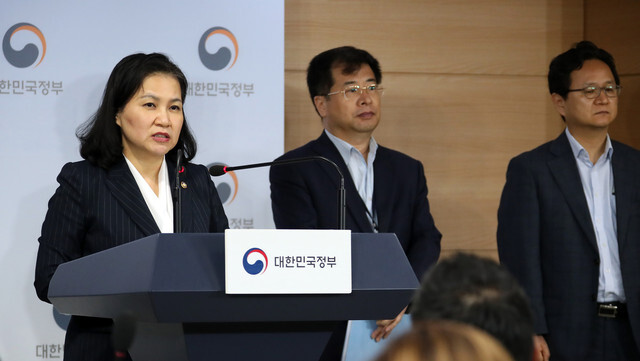hankyoreh
Links to other country sites 다른 나라 사이트 링크
S. Korean trade minister says rice excluded from RCEP concessions

South Korea’s top trade official said on Nov. 11 that rice was excluded from the concessions in the Regional Comprehensive Economic Partnership (RCEP).
Recently, a sense of crisis has been spreading through the Korean farming sector because of major progress in RCEP negotiations and Seoul’s decision to abandon developing country status at the World Trade Organization (WTO).
Against that backdrop, Trade Minister Yoo Myung-hee added that Seoul is “taking part in market liberalization negotiations while doing everything it can to account for the sensitivity of the agricultural sector.”
“We’re nearing the finishing line in negotiations about market liberalization between the various member states. In the ministerial meeting, we agreed to wrap up negotiations on individual items by the end of the year, but the timing of the final signing has been pushed back to next year,” Yoo said during a press conference at the Government Complex Sejong on Monday afternoon.
“Since we’re currently linked to each country through separate free trade agreements, companies have to abide by rules that vary with each separate place of origin. Once place-of-origin regulations are integrated through multilateral negotiations, however, exports and trade for will become much easier for SMEs,” the official said.
In regard to whether the US will slap tariffs on automobiles under Section 232 of the Trade Expansion Act by the deadline of Nov. 13, Yoo showed reluctance to assume that South Korea would be exempted from the tariffs. “We’ve repeatedly indicated to the Americans that we shouldn’t be included in the tariffs because we’ve been faithfully carrying out the promises we made in our negotiations about revising the KORUS FTA [South Korea-US Free Trade Agreement]. When I visited the US last month, both the US Trade Representative and [Larry] Kudlow, director of the National Economic Council, expressed positive viewpoints about bilateral trade and investment after the KORUS FTA revision,” she said.
Yoo declined to speak in detail about the government’s position and negotiating strategies about the second round of bilateral deliberations with Japan, scheduled for Nov. 19, about a complaint that South Korea has lodged with the WTO over Japan’s export controls. “All that I can tell you is that we’ll do our best in the bilateral deliberations on Nov. 19. Since the next step depends on the outcome of the bilateral deliberations, I’ll be able to tell you about the timeframe for a solution after seeing how the negotiations turn out,” she said.
But Yoo emphasized that the only way the bilateral deliberations wouldn’t lead to the establishment of a panel of experts would be if Japan fully reverses its export controls. If bilateral deliberations break down after a complaint is lodged with the WTO, a panel of experts is convened to initiate the actual trial phase of the complaint. The government is under considerable pressure to avoid that step, which often delays the final outcome. Expert review typically takes one or two years, though in recent years that review has sometimes lasted more than three years.
Yoo also spoke about the trade prospects for next year. “Protectionism and unilateralism are likely to expand and intensify. Whereas protectionist measures have previously been limited to anti-dumping measures and other import controls, they will likely expand in atypical directions, such as cutting off various privileges in imports, exports, and other areas. We’ll be striving to take preemptive and swift measures, through market expansion and diversification and institutional innovation, for example, in order to overcome those challenges,” she said.
By Kim Eun-hyoung, staff reporter
Please direct comments or questions to [english@hani.co.kr]

Editorial・opinion
![[Guest essay] Amending the Constitution is Yoon’s key to leaving office in public’s good graces [Guest essay] Amending the Constitution is Yoon’s key to leaving office in public’s good graces](https://flexible.img.hani.co.kr/flexible/normal/500/300/imgdb/original/2024/0416/8917132552387962.jpg) [Guest essay] Amending the Constitution is Yoon’s key to leaving office in public’s good graces
[Guest essay] Amending the Constitution is Yoon’s key to leaving office in public’s good graces![[Editorial] 10 years on, lessons of Sewol tragedy must never be forgotten [Editorial] 10 years on, lessons of Sewol tragedy must never be forgotten](https://flexible.img.hani.co.kr/flexible/normal/500/300/imgdb/original/2024/0416/8317132536568958.jpg) [Editorial] 10 years on, lessons of Sewol tragedy must never be forgotten
[Editorial] 10 years on, lessons of Sewol tragedy must never be forgotten- [Column] A death blow to Korea’s prosecutor politics
- [Correspondent’s column] The US and the end of Japanese pacifism
- [Guest essay] How Korea turned its trainee doctors into monsters
- [Guest essay] As someone who helped forge Seoul-Moscow ties, their status today troubles me
- [Editorial] Koreans sent a loud and clear message to Yoon
- [Column] In Korea’s midterm elections, it’s time for accountability
- [Guest essay] At only 26, I’ve seen 4 wars in my home of Gaza
- [Column] Syngman Rhee’s bloody legacy in Jeju
Most viewed articles
- 1[Guest essay] Amending the Constitution is Yoon’s key to leaving office in public’s good graces
- 2[Guest essay] How Korea turned its trainee doctors into monsters
- 3[News analysis] Watershed augmentation of US-Japan alliance to put Korea’s diplomacy to the test
- 4Faith the power of memory: Why these teens carry yellow ribbons for Sewol
- 5[Column] A death blow to Korea’s prosecutor politics
- 6US grants Samsung up to $6.4B in subsidies for its chip investments there
- 7[Editorial] 10 years on, lessons of Sewol tragedy must never be forgotten
- 8‘National emergency’: Why Korean voters handed 192 seats to opposition parties
- 9How Samsung’s promises of cutting-edge tech won US semiconductor grants on par with TSMC
- 10[Photo] Cho Kuk and company march on prosecutors’ office for probe into first lady